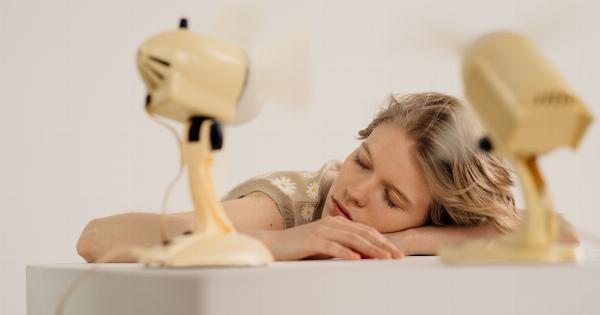Sleeping with a fan on can provide several benefits such as keeping the room cool, creating white noise, and improving air circulation. However, questions have been raised about whether sleeping with a fan can pose any health risks.
In this article, we will explore the potential health risks associated with using a fan while sleeping and provide some tips for safe and comfortable fan usage.
1. Dryness and Dehydration
One concern is that sleeping with a fan may cause dryness and dehydration. The rapid air circulation from the fan can increase evaporation from your skin and respiratory system, potentially leading to dry mouth, dry eyes, and dry skin.
To minimize the risk of dehydration, it is important to stay adequately hydrated by drinking sufficient water throughout the day and keeping a glass of water nearby while sleeping with a fan.
2. Sinus and Nasal Issues
Another possible health risk is the exacerbation of sinus and nasal problems. The consistent breeze from the fan can cause the nasal passages to dry out, leading to discomfort and potential congestion.
If you are prone to sinus or nasal issues, it is advisable to use a humidifier along with the fan to maintain moisture in the air and prevent dryness.
3. Allergies and Dust
For individuals with allergies or asthma, sleeping with a fan can potentially worsen their condition. Fans tend to move air around the room, which may stir up dust, pollen, and other allergens that can trigger allergic reactions or asthma symptoms.
Regular cleaning and dusting of the fan can help reduce the buildup of allergens and minimize the risk of exposure.
4. Noise Disturbance
While many people find the white noise generated by a fan to be soothing and helpful for sleep, others may find it bothersome or disruptive.
If the noise from the fan becomes a source of disturbance, using a fan with lower noise levels or utilizing earplugs can help mitigate the issue.
5. Muscle Stiffness and Soreness
Some individuals may experience muscle stiffness or soreness as a result of sleeping with a fan directly blowing air on them. The constant stream of air can cause the muscles to cool down too quickly, leading to discomfort and potential stiffness.
Placing the fan at an appropriate distance or using a fan with adjustable settings can help prevent excessive cooling of the body and reduce the risk of muscle stiffness.
6. Circulation Issues
In rare cases, sleeping with a fan directly blowing on you can potentially cause circulation issues.
The concentrated and cool airflow may constrict blood vessels and affect blood circulation, particularly in individuals who already have poor circulation or underlying medical conditions. If you experience any unusual symptoms like numbness or tingling, it is advisable to consult a healthcare professional.
7. Dry Eyes
Sleeping with a fan may cause dry eyes for some individuals. The constant draft of air can increase evaporation from the tear film of the eyes, leading to dryness, itching, and irritation.
Using lubricating eye drops before bed and ensuring proper eye hydration during the day can help alleviate this issue.
8. Temperature Sensitivity
While fans can provide relief from heat, some people are more sensitive to temperature changes. Sleeping with a fan may cause discomfort, chills, or fluctuations in body temperature for those who are particularly sensitive to cold air.
Adjusting the fan speed, using a fan with adjustable settings, or using additional blankets can help regulate body temperature and minimize any potential discomfort.
9. Carbon Dioxide Accumulation
There is a common belief that sleeping with a fan in a closed room can lead to carbon dioxide (CO2) accumulation, which can be harmful. However, this belief is not accurate.
Fans do not generate or release carbon dioxide; instead, they promote better air circulation, which can help maintain fresh air in the room. It is important to note that keeping the bedroom properly ventilated is still crucial for overall air quality and health, regardless of whether you use a fan or not.
10. Fan Safety Precautions
To ensure safe usage of fans while sleeping, it is important to follow a few safety precautions:.
- Keep the fan at a safe distance from your bed to prevent direct exposure and excessive cooling.
- Ensure the fan is securely placed on a stable surface to avoid tipping over during the night.
- Regularly clean and dust the fan to reduce allergen buildup.
- Use a fan with adjustable settings to control the airflow intensity and direction.
- Consider using a humidifier in conjunction with the fan to maintain optimal humidity levels.
- Keep the bedroom adequately ventilated to promote fresh air circulation.
Conclusion
Sleeping with a fan can offer numerous benefits such as cooling the room, providing white noise, and improving air circulation.
While there are potential health risks associated with using a fan while sleeping, most of these risks can be minimized or eliminated by taking necessary precautions and addressing individual concerns. As with any lifestyle choice, it is important to listen to your body and adapt your sleeping environment to ensure comfort, safety, and overall well-being.






























